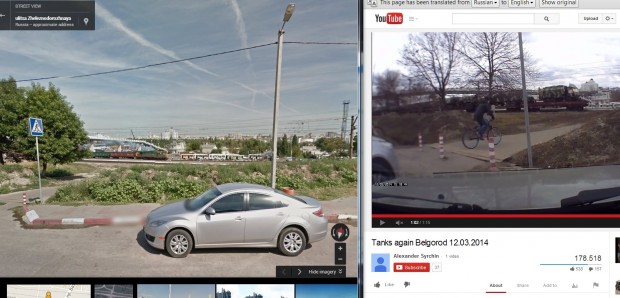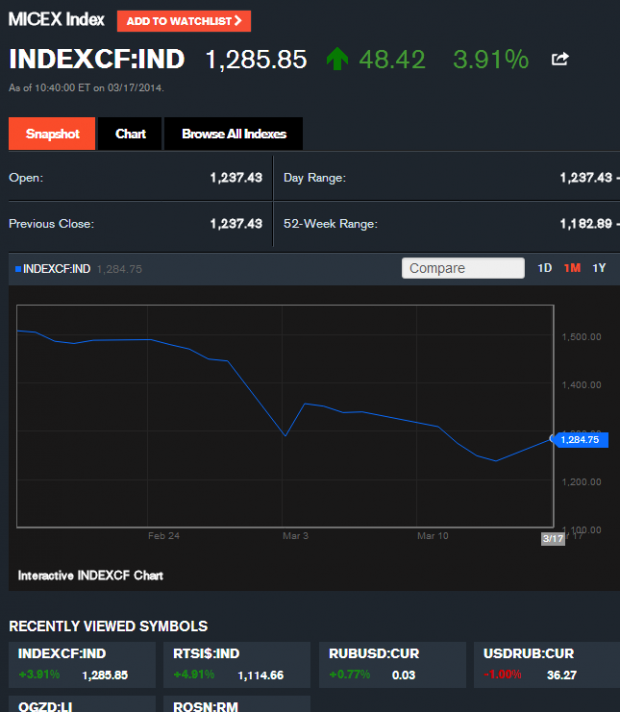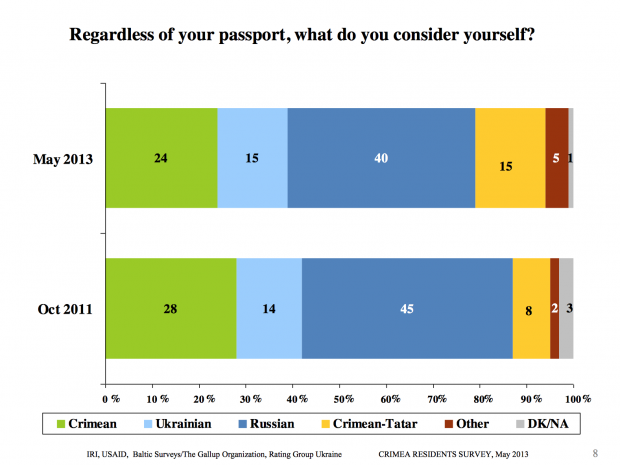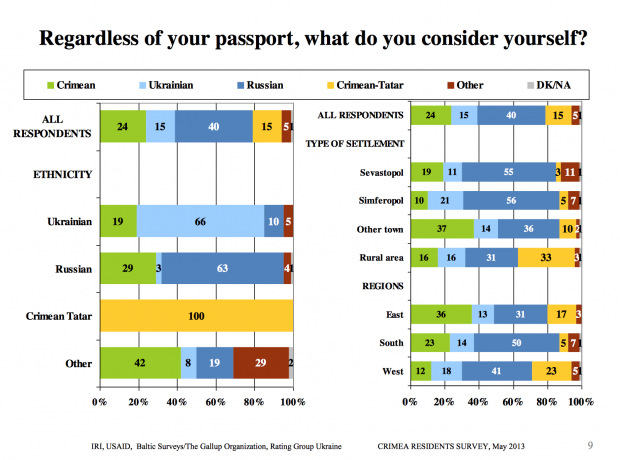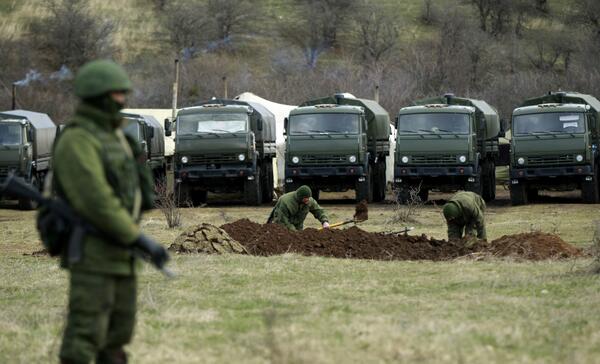The results of Crimea’s referendum were overwhelming in favor of joining Russia. The government in Ukraine, and most of the international community, does not recognize the referendum. With Russian and Ukrainian military forces digging in only kilometers from each other, the world waits to see what happens next.
Yesterday’s liveblog can be found here. For an overview and analysis of this developing story see our latest podcast.
Please help The Interpreter to continue providing this valuable information service by making a donation towards our costs.
Below, we will be making regular updates throughout the day:
2207 GMT: Refat Chubarov, chairman of the Crimean Tatar Medjlis (Assembly), announced at a press conference today in Simferopol that the Crimean Tatar found dead last week with marks of torture was Reshat Ametovyakiy (Ametov), Ukrainskaya Pravda reported, citing Radio Svoboda. Ametov had gone to the draft board when authorities in Kiev announced mobilization in Ukraine, and then disappeared after the military office was seized by Russian soldiers and “Crimean self-defense” personnel. Police as well as Medjlis lawyers are investigating the case, but the authorities had no comment.
Tortured Reshat Ametov's body was identified by his wife. Funerals scheduled for 18th.
— Ryskeldi Satke (@RyskeldiSatke) March 17, 2014
Deceased Reshat Ametov was recorded by local TV crew protesting in front of Parliament in Simferopol. pic.twitter.com/jP1QQSSysl
— Ryskeldi Satke (@RyskeldiSatke) March 17, 2014
Dead Crimean Tatar is Reshat Ametovyakyy went enlist Ukr forces 3 March where abducted Russian "self-defence" forces. http://t.co/yiU8IL0d1o
— Taras Kuzio (@TarasKuzio) March 17, 2014
2054 GMT: Josh Rogin reports that Putin will pass sanctions on US government officials in retaliation for today’s sanctions against Russian officials:
U.S. senators, congressmen and top Obama administration officials are sure to be on Vladimir Putin’s sanctions list; a response to the Obama Administration’s announcement on Monday that 7 Russian officials and 4 Ukrainian officials would be barred from holding assets or traveling to the United States.
Putin is expected to release his retaliation list as early as Tuesday and while the final list is still being crafted, it will include top Obama administration officials and high profile U.S. senators, in an effort to roughly mirror the U.S. sanctions against Russian officials and lawmakers, according to diplomatic sources. At the top of the list in Congress is Senate Majority Whip Dick Durbin, who recently co-authored a resolution criticizing Russia’s invasion of Crimea.
2045 GMT: This video is from March 12, but we had not seen it before. We count 38 armored vehicles and/or tanks, 38 troop carriers or support vehicles, and train cars that may be full of soldiers:
http://t.co/nhXRoCajyM @hellmuthcstuven #Russian armored vehicles in #Belgorod, #Russia, an hour drive fr #Kharkiv, #Ukraine #RussiaInvasion
— Ukrainian Updates (@Ukroblogger) March 17, 2014
We can’t confirm the date that the video was filmed, though it was uploaded on the 12th. What we can confirm is the location. This is Belgorad (here on a map) and the train is headed west, or possibly southwest which is where the majority of train traffic flows — towards Kharkiv:
1928 GMT: Since war could be on the horizon, here’s another perspective from Politico, who was that there are only 6,000 Ukrainian infantry ready to fight:
However, a few things to keep in mind. First, the fact that the Ukrainian government only says it has 6,000 combat ready troops is likely a recruiting tactic, and the message that Kiev wants the rest of the world to hear. Here’s an excerpt from Andrew Bowen’s latest assessment:
Opposing the invasion would be Ukraine’s military, which, although severely underfunded (Russia spends about $78 billion on its military compared to Ukraine’s $1.6 billion) and significantly smaller than Russia’s, is still manifestly better than Georgia’s. As NYU Professor Mark Galeotti noted in the Washington Post; “The Russian military could roll into Ukraine, but it would be up for a fight. The Ukrainians are rather more ready than the Georgians.” Despite that fact, there are two significant factors that make the threat of a further Russian incursion all the more worrying: the need to mobilize most of the military and that most units are still stationed in the west of Ukraine.
On Tuesday, acting Ukrainian President Oleksandr Turchynov said that Ukraine has only 6,000 combat ready infantry and called for the creation of a National Guard, but those figures and the calls for a new force are most likely exaggerations meant to goad NATO and the west into providing more significant security guarantees. However, despite ending conscription last year and moving towards an all-volunteer military, much of the Ukrainian military is still reliant on Soviet methodology, including most forces still being positioned in the West of the country, which focused on a potential conflict with NATO. Dr. Dmitry Gorenburg, an associate at the Davis Center for Russian and Eurasian Studies at Harvard University, summarizes the allocation of Ukrainian forces in the country,
“There are two mechanized infantry brigades, a tank brigade, and an artillery brigade in the east, though, as well as an airborne brigade and a tactical aviation brigade. Compare this to western Ukraine, where there are five mechanized infantry brigades, two artillery brigades, a tank brigade, a rocket brigade, four tactical aviation brigades, two army aviation regiments, and an air mobile brigade. Also worth highlighting the forces located in the south, near the Crimea: one mechanized infantry brigade, a tactical aviation brigade, an air mobile brigade and an army aviation regiment.”
Read the entire analysis: Yes Russia Controls Crimea, and Yes Those Really are Russian Troops: A breakdown of Russian and Ukrainian military presence and capability.
The other thing to keep in mind is that much of Russia’s modernizatsiia efforts, which are driving up its military spending, are irrelevant to the crisis in Ukraine. Again, Andrew Bowen:
Putin launched the State Armaments Programme (SAP-2020), which has sought to invest $773 billion by 2020. The SAP-2020’s goal is to arm 70% of the Russian military with modern weaponry by 2020: 350 new fighter jets (including the new fifth generation T-50 fighter), some 1,000 helicopters, 54 surface ships and 24 new submarines (including the Borei-class ballistic missile submarine), and additional nuclear strike capabilities (which includes designing a new ICBM, the RS-26).
Research and development of expensive equipment, nuclear submarines, additional nuclear strike capabilities, and ships parked in the Pacific, all add to Russia’s military budget, but they don’t necessarily add to Russia’s ability to strike Ukraine.
1901 GMT: There are two separate and important arguments that can be made from these facts:
Crimea dependence on #Ukraine: 80% of electricity 85% of water 70% of food 70% of tourists Suspect Putin doesn't intend to stop w Crimea
— ian bremmer (@ianbremmer) March 17, 2014
The first is that an independent Crimea was never really an option, as Crimea would always be dependent on Russia and/or Ukraine, and Ukraine stated that it would not recognize Crimea’s independence.
The second thing that can be taken from this data, Ian Bremmer already hints at — Crimea still needs Ukraine, and if Crimea becomes Russian, then Russia may still need Ukraine.
1857 GMT: Is Putin dangerous? Erratic? Expansionist? Neo-Soviet? Paranoid? What IS motivating Russia’s President in Ukraine? Paul Goble writes on our Window on Eurasia column:
In an article on the Colta.ru portal today entitled, “A Conservative Revolution – The Meaning of Crimea,” Morozov suggests that the Ukrainian crisis has entered a new phase, one of “war” rather than political “trade” and that explanations which fail to recognize that cannot explain what Putin is doing and where he is leading Russia.
Morozov begins by surveying what he describes as three basic interpretations of Crimea: the first, offered by many in Moscow and elsewhere is that what Putin has done is a form of “revenge” for Kosovo and that no one should think that Putin “is beginning any ‘new process’” at all.
The second, he suggests, is that “the ‘Ukrainian strategy’ of the Kremlin is a conscious effort to begin a new war with the West.” In that view which has been articulated by Fyodor Lukyanov, “Crimea is only a casus belli” rather than revenge for Kosovo, and thus represents an effort to overturn 1991 and “begin a new era” in international relations.
Read the entire article: Analyst: Crimea’s Annexation Shows World a New and Far More Dangerous Putin
1851 GMT: Russian President Vladimir Putin has signed a decree that recognizes Crimea as an independent republic, effective immediately. So far, it seems that the legal process is that this opens the way for the State Duma to debate about whether Russia should accept a request, received from Crimean parliament, for Crimea to become part of the Russian Federation.
1832 GMT: Interestingly, before today’s sanctions were announced, and before the Russian economy got a much-needed bounce, the Russian government started to admit that it had serious concerns about the economy. Reuters reports:
For weeks, Russian officials have said the confrontation between Moscow and the West over Ukraine that threatens economic sanctions and asset freezes would “weigh on the economy”.
Although not speaking directly about the impact from the conflict, Deputy Economy Minister Sergei Belyakov said on Monday the economy was in trouble.
“The economic situation shows clear signs of a crisis,” Belyakov told a local business conference.
Today, Russia’s MICEX index rose 3.91%, but it’s still down nearly 15% since the start of the revolution in Ukraine on February 18th.
1755 GMT: The independent Russian media outlet Novaya Gazeta has published an article, written by an analyst, that suggests that Russia is really only capable of winning wars where it has a significant military advantage, such as with Georgia, and a prolonged war in Ukraine could backfire and become a destabilizing force inside Russia.
Read an assessment in our column, Window on Eurasia. Russia, Now at War in Ukraine, is Between Reaction and Revolution
1730 GMT: A reader forwards us an interesting poll, taken by IRI in May of 2013. What it shows is that Crimean populace is likely far more divided on the issue of Russian annexation than yesterday’s official referendum results suggest. Here’s two key charts:
While it is fair to say that circumstances have changes, and so likely too have opinions, so if one assumes that 100% of those who are Russian voted to join Russia, that’s only 40%. According to the official results, 97% opted to join Russia. Where did the other 57% come from? This poll doesn’t really address the question of joining Russia or not. One also has to remember that, according to the official results, more than 80% of registered voters cast a ballot. If one assumes that all of those who identify as Tatar or Ukrainian either voted for independence or boycotted the vote, that assumption clashes with the official results. Also note that the trends between 2011 and 2013 show an increasing Ukrainian, Tatar, and Crimean population, with a shrinking Russian population.
The poll is not conclusive, but it’s interesting data because it clearly shows that there are significant problems with the referendum results. Yesterday we exposed some of the observed problems with the voting.
1600 GMT: NATO has announced that Atlas Vision, a training exercise scheduled to take place in Russia this summer, is canceled. Rapid Trident, however, an exercise to be held in Western Ukraine, will continue as planned. The Atlantic Council says that “the fact that the U.S. and its allies chose to go ahead with an exercise in Ukraine while canceling the one in Russia demonstrates Western support for Kiev in its confrontation with Moscow.”
1548 GMT: The Russian stock market reacted favorably to the announcement of new US sanctions:
At 1430 GMT the dollar-denominated RTS index .IRTS was up 4.9 percent at 1,115 points, while the ruble-denominated MICEX was up 3.7 percent at 1,283 points.
“The general belief in the market is that East Ukraine is actually the red line in terms of ratcheting up to much more economically damaging politics,” Macro-Advisory consultant Chris Weafer said, referring to fears civil unrest in Russian-speaking regions may give Russia a pretext for military intervention outside Crimea.
“Until it’s clear what Russia’s intentions in East Ukraine are the market will remain very nervous and very twitchy,” Weafer said.
As we’ve been saying since this crisis began, Putin clearly knows that his actions in Crimea will have a price, and he’s anticipated what that price might be. But if the price is less than this, he’ll be able to call Russia’s annexation of Crimea a clear victory, and he may be encouraged to do more. On the other hand, if the price tag is higher than Putin bargained for, Russia’s economy could turn a territorial victory into a strategic defeat.
So this battle may be decided in the stock markets, not on the battlefields.
1535 GMT: Ukrainian forces will not flee Crimea, despite a truce signed with Russian forces that gives them until Friday to do so:
“Crimea was, is, and will be our territory,” said Defense Minister Ihor Tenyukh in a statement delivered at the Ukrainian Crisis Media Center on March 17.
Former heavyweight boxing champion and leader of the Ukrainian Democratic Alliance for Reform Vitali Klitschko announced that Ukrainian troops would remain at their bases, even after March 21, the end of a peace treaty signed by the interior ministries of Ukraine and Russia.
In accordance with the March 16 peace treaty, the Russian Interior Ministry promised to allow Ukrainian soldiers to pass freely into and out of their bases, which Russian troops had surrounded for more than two weeks. Tenyukh said that the Russian military had thus far respected the terms of the treaty.
With Russian troops abiding by the truce, but digging in outside Ukrainian bases, will we see a military showdown on Friday night?
The Kyiv Post also reports on the mobilization efforts of the Ukrainian military. Today the parliament allotted an additional 6.7 billion hryvnia (more than $600 million) over the next three months in defense spending, a sum which should help mobilize an additional 40,000 troops.
1526 GMT: NATO has announced that it is seeking to expand its cooperation with Ukraine:
NATO said in a statement the alliance was determined to boost cooperation, including the “increased ties with Ukraine’s political and military leadership, strengthening efforts to build the capacity of the Ukrainian military and more joint training and exercises.”
Deshchytsya said in talks with NATO Secretary-General Anders Fogh Rasmussen he “discussed our possible cooperation in the field of sending monitors to Ukraine.”
1507 GMT: A UN report has found that ethnic Russians have not faced widespread abuse in either Crimea or Ukraine, but this report has been heavily condemned by the Russian government:
The Russian Foreign Ministry statement criticised U.N. Assistant Secretary General for Human Rights Ivan Simonovic who said last week there had been violations against ethnic Russians in Ukraine but said there was no evidence they were “widespread or systematic”.
“The biased, prejudiced and unobjective assessment of I. Simonovic on the human rights situation in the country calls forth surprise and confusion,” said the ministry in a statement.
Aside from the disputed situation in Kharkiv last Friday when two pro-Russian were killed, there has been no evidence that ethnic Russians have been victims since the Yanukovych government fell. Furthermore, the new mayor of Kharkiv says that those two pro-Russians who were killed on Friday were the attackers in an assault on a building. That narrative has also been disputed.
1505 GMT: In Paul Goble’s latest entry in our Window on Eurasia column, a Russian analyst argues that what’s happening in Crimea has no similarity to what happened in Kosovo:
Russian nationalists claim that what the West did in the former Yugoslavia represents a precedent for what Moscow is doing in Ukraine now, but in fact, Yekaterinburg analyst Fedor Krasheninnikov says, there is no basis for such an analogy because “Crimea is not Kosovo” and Russia’s actions are in no way like those of the West earlier.
Read the entire article: Kosovo No Precedent for Moscow’s Actions in Crimea
1450 GMT: Barack Obama has reiterated that further sanctions may be in the pipeline, with a focus on the Russian leadership and defense industries. He reiterated that the Crimean referendum is not recognized by the US, Russian needs to withdraw its troops from Crimea, and the territorial integrity and sovereignty of Ukraine and the legitimacy of the Ukrainian government need to be respected.
1448 GMT: Barack Obama is speaking now. Watch it here.
1447 GMT: Though the leaders in Crimea have been named in today’s fresh sanctions, were enough Russians the target of the sanctions? Here’s one indication:
Strong signal? Russian markets rally on relief that sanctions lists limited #ukraine
— greg white (@whitegl) March 17, 2014
1435 GMT: The Russian State Duma has taken up three “law-like” measures: a law that would restore Soviet-era religion and nationality lines to passports. This could help Russian import, export, and crack down upon certain religions or nationalities. The second would penalize “Russophobia,” which would assist in the crackdown against the Kremlin’s critics.
The third law would make it easier to nationalize territory (like Crimea). Read our latest Window on Eurasia report, Russian Duma Takes Up Three Dangerous ‘Law-Like’ Measures, for more details and analysis.
1430 GMT: The White House has passed sanctions on both Russian and Ukrainian leaders in light of yesterday’s referendum. Here are excerpts from the white House fact sheet on the new sanctions. The full document can be read here:
President Obama today issued a new Executive Order (E.O.) under the national emergency with respect to Ukraine that finds that the actions and policies of the Russian government with respect to Ukraine -– including through the deployment of Russian military forces in the Crimea region of Ukraine –- undermine democratic processes and institutions in Ukraine; threaten its peace, security, stability, sovereignty, and territorial integrity; and contribute to the misappropriation of its assets…
In response to the Russian government’s actions contributing to the crisis in Ukraine, this new E.O. lists seven Russian government officials who are being designated for sanctions. These individuals are Vladislav Surkov, Sergey Glazyev, Leonid Slutsky, Andrei Klishas, Valentina Matviyenko, Dmitry Rogozin, and Yelena Mizulina…
In addition to the new E.O., the Treasury Department today has imposed sanctions on four other individuals under E.O. 13660, issued on March 6, for their actions or policies that threaten the peace, security, stability, sovereignty, or territorial integrity of Ukraine and in undermining the Government of Ukraine. They are Crimea-based separatist leaders Sergey Aksyonov and Vladimir Konstantinov; former Ukrainian presidential chief of staff Viktor Medvedchuk; and former President of Ukraine Viktor Yanukovych…
- Vladislav Surkov: Surkov is being sanctioned for his status as a Presidential Aide to Russian President Vladimir Putin.
- Sergey Glazyev: Glazyev is being sanctioned for his status as a Presidential Adviser to Russian President Vladimir Putin.
- Leonid Slutsky: Slutsky is being sanctioned for his status as a State Duma deputy, where he is Chairman of the Duma Committee on CIS Affairs, Eurasian Integration, and Relations with Compatriots.
- Andrei Klishas: Klishas is being sanctioned for his status as a Member of the Council of Federation of the Federal Assembly of the Russian Federation and as Chairman of the Federation Council Committee of Constitutional Law, Judicial, and Legal Affairs, and the Development of Civil Society.
- Valentina Matviyenko: Matviyenko is being sanctioned for her status as Head of the Federation Council
- Dmitry Rogozin: Rogozin is being sanctioned for his status as the Deputy Prime Minister of the Russian Federation.
- Yelena Mizulina: Mizulina is being sanctioned for her status as a State Duma Deputy.
- Sergey Aksyonov: Aksyonov is being designated for threatening the peace, security, stability, sovereignty, or territorial integrity of Ukraine, and for undermining Ukraine’s democratic institutions and processes. Aksyonov claims to be the Prime Minister of Crimea and has rejected the authority of the legitimate government in Kyiv.
- Vladimir Konstantinov: Konstantinov is being designated for threatening the peace, security, stability, sovereignty, or territorial integrity of Ukraine, and for undermining Ukraine’s democratic institutions and processes. Konstantinov is the speaker of the Crimean parliament, which on March 11, 2014, declared independence from Ukraine.
- Viktor Medvedchuk: Medvedchuk, leader of Ukrainian Choice, is being designated for threatening the peace, security, stability, sovereignty, or territorial integrity of Ukraine, and for undermining Ukraine’s democratic institutions and processes. He is also being designated because he has materially assisted, sponsored, or provided financial, material, or technological support to Yanukovych and because he is a leader of an entity that has, or whose members have, engaged in actions or policies that undermine democratic processes or institutions in Ukraine and actions or policies that threaten the peace, security, stability, sovereignty, or territorial integrity of Ukraine.
- Viktor Yanukovych: Former Ukrainian President Yanukovych is being designated for threatening the peace, security, stability, sovereignty, or territorial integrity of Ukraine, and for undermining Ukraine’s democratic institutions and processes. After abandoning Kyiv and ultimately fleeing to Russia, Viktor Yanukovych called upon Russian President Vladimir Putin to send Russian troops into Ukraine.
1336 GMT: So what happens to the Ukrainian bases in Crimea that have refused to surrender? This statement from the Crimean government today indicates that all Ukrainian government assets in Crimea will be nationalized by Crimea. That would probably include military bases. Yesterday, a truce between the Russian Black Fleet and the Ukrainian military was announced. That truce expires on March 21st — Friday. So will we see Russian military action on Friday night? The Russian troops appear to already be digging in outside Ukraine’s military bases.
Russian soldiers dig a trench near the Ukrainian military base in Perevalnoye. (David Mdzinarishvili/Reuters) pic.twitter.com/pXR2LeJuhD
— Michael Kelley (@MichaelKelleyBI) March 17, 2014
1310 GMT: After Crimeans were arguably given a false choice, and despite significant problems with the election process, the results of yesterday’s Crimean referendum are in, and the results say that the people of Crimea have voted to join Russia. AP reports:
Mikhail Malyshev [ head of the referendum election commission] told a televised news conference that the final tally from Sunday’s vote was 96.8 percent in favor of splitting from Ukraine. He also said that the commission has not registered a single complaint about the vote.
We’ve seen several different figures floated for the turnout number, but according to Crimean authorities more than 80% of Crimea’s registered voters cast a ballot yesterday.
Crimean parliament has now formally declared its independence from Ukraine. Kyiv Post reports that the Crimean Supreme Council will meet sometime today to formally ask the Russian government to annex Crimea. BBC provides details of what the Crimean government is already doing:
According to the vote in Crimea’s parliament on Monday, Ukrainian laws now no longer apply in the region, and all Ukrainian state property belongs to an independent Crimea.
The peninsula will adopt the Russian currency, the rouble, and clocks will move two hours forward to Moscow time by the end of March.
The document approved by MPs also appealed to “all countries of the world” to recognise Crimean independence.
Crimea’s pro-Russia leader Sergei Aksyonov tweeted that in the wake of the vote, Moscow had given Crimea financial assistance amounting to 15bn roubles ($410m: £246m), which he said doubled the region’s budget.
He said he was travelling immediately to Moscow to discuss the next steps.
